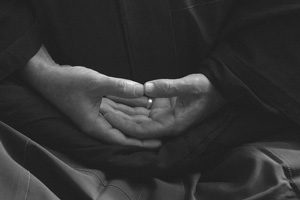What Is Zen?
There are many answers to this question, and the question itself is an example of a koan, one of those challenging questions which, coupled with their enigmatic answers, have been hurled back and forth between Zen teachers for many generations. Not considering the question as a koan, but taking it at face value, here are a few (and hopefully not enigmatic) answers:
Zen is a form of Buddhism that emerged in China in the 6th and 7th century of the Common Era.
The birth of Zen was fostered by the meeting of the strain of Mahayana Buddhism that emphasized a style of concentrated meditation and important currents of the Chinese culture, namely Taoist mystical philosophy and Confucian practicality. From China, Zen spread to Southeast Asia, Korea, and Japan during the second millennium and is now spreading throughout Europe and the Americas, even to rural Mississippi! The Soto Zen tradition practiced here comes through Japan, where it was further influenced by 500 years of immersion in that culture. This particular lineage continues to evolve through its encounter with the West in Europe, New Orleans, and now Mississippi.
 As a school of Buddhism, Zen affirms the Buddha’s Awakening and the promise of his fundamental teaching, which is that it is possible for a human being to find “an end to suffering.” Just what this “suffering” is and how one goes about realizing its “end” is at the heart of what Buddhism is about. Zen aspires to be a way of realizing and actualizing this great promise of the Buddha personally, intimately, immediately, here and now. As a form of Mahayana Buddhism, Zen also affirms the Buddha’s ethical teachings, accepts the Buddhist precepts as a guideline for an ethical life, and strives to help all beings and treat them with compassion.
As a school of Buddhism, Zen affirms the Buddha’s Awakening and the promise of his fundamental teaching, which is that it is possible for a human being to find “an end to suffering.” Just what this “suffering” is and how one goes about realizing its “end” is at the heart of what Buddhism is about. Zen aspires to be a way of realizing and actualizing this great promise of the Buddha personally, intimately, immediately, here and now. As a form of Mahayana Buddhism, Zen also affirms the Buddha’s ethical teachings, accepts the Buddhist precepts as a guideline for an ethical life, and strives to help all beings and treat them with compassion.
The word Zen is said to be a Japanese translation of the Chinese Ch’an, which is said to be a Chinese translation of the Sanskrit Dhyana, which means “concentration, meditation, or absorption.” (For more, see Zen and Buddhism.)
Zen is a regular, repetitive practice.
Zen is something you primarily do, rather than something you primarily think about, talk about, or believe in. By far, the most important thing that you must do, if you want to follow the way of Zen, is to practice zazen, Zen’s name for its style of seated meditation. (For more, see About Zazen.) For serious practitioners, zazen becomes an indispensible part of their lives, something they do routinely and naturally, like “eating, sleeping and going to the toilet,” as the saying goes.
Zen is about waking up.
“Awakening” is the central mystery of Buddhism, one that can only be pointed to with words, but not captured by any definition. It is something to be experienced and lived, not just another concept to be grasped by the intellect. In the Zen approach, one begins, ends, and continually practices by “waking up” to what is actually occurring here and now.
As such, Zen cannot be adequately categorized as a “spiritual” practice, as some people are wont to do. Zen is more a way of life, and its practice is “about” every aspect of your life, however you want to categorize it: physical, mental, emotional, spiritual, relational. Zen is concerned with whatever it is that you are aware of; it is concerned with what is, your “waking up” to this reality and experiencing it fully, however it is manifesting in your life.
Zen is about “clarifying the great matter.”
This phrase is from Zen Master Dogen and is another way of talking about the “heart of the Buddha’s teaching." This “great matter” will most often present itself in the form of some basic question or fundamental concern, something that your mind returns to over and over, something that may be deeply disturbing or merely nagging, but definitely unresolved. In other words, it is what the Buddha called dukkha, a sense of unsatisfactory-ness or “suffering,” as the term is usually translated.
Often the great matter takes the form of an essential question, one that you are compelled to seek an answer to and are willing to put a great deal of effort toward. For Shakyamuni it was “What is the end of suffering?” For Dogen it was, “If we are originally enlightened, why do we need to practice?” These question become koans in a larger sense: burning questions that will not go away, that can function as guides to your practice. This process of resolving your deep questions is “clarifying the great matter.”
While there is no one “most basic” question that holds true for everyone, such questions as “Who am I?” "Where do I come from?” “What is real?” “Does life have any meaning or significance?” and “Just what is this all about?” are representative of those kinds of questions that human beings have asked and tried to answer since time immemorial. In Zen, these basic questions include “What is Zen?” "What is Buddha?” “What is Mind?” “What is Enlightenment?” In other words, “What is This?” as well as classic Zen koans such as “What was your original face before your parents were born?” “Who is it that thus comes?” and “What is mu?”
